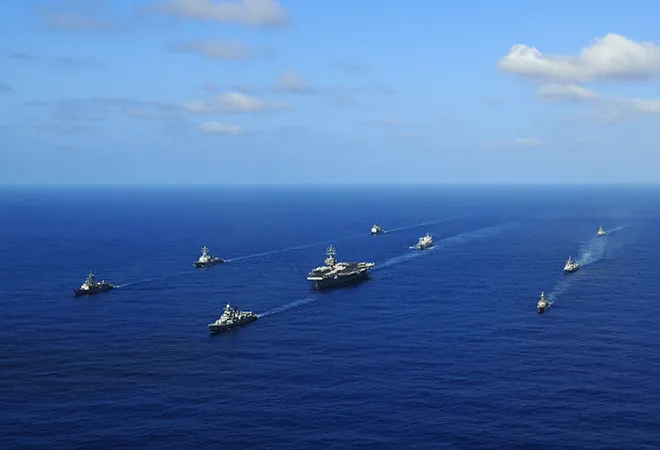 This article is part of the series — BIMSTEC in 2021.
This article is part of the series — BIMSTEC in 2021.
As the name suggests, the Bay of Bengal Initiative for Multi-Sectoral Technical and Economic Cooperation, or BIMSTEC, is a regional bloc devoted to coordinating development projects in the countries around the rim of the eastern Indian Ocean. But the fact that the seven-member alliance includes not only India, Bangladesh, Sri Lanka, Myanmar and Thailand but also land-locked Nepal and Bhutan suggests a wider agenda. BIMSTEC was founded in 1997 and not by coincidence at time when China, for the first time since seafarer Zheng He sailed his fleets across the Indian Ocean in the 15
th century, began to flex its muscles in a maritime region that India has long considered to be its “own lake.”
Thailand as well as Nepal maintain cordial relationships with Beijing and, at the time, some political observers in the region argued — and not without reason — that the drill was aimed at countering China’s growing influence in the region.
Sure enough, when India was going to host the first-ever military drill among the armies of the BIMSTEC member states in September 2018, the Chinese official news agency
Xinhua was quick to report that Nepal would not take an active part in the exercise. According to
Xinhua, Nepal’s decision “was made by the government amid growing criticism from multiple quarters over Nepal’s participation” — without specifying what the critics had actually said. Thailand also announced that it, like Nepal, would participate only as an observer. Thailand cited “prior commitments” as the reason for its decision to stay away from the drills. Thailand as well as Nepal maintain cordial relationships with Beijing and, at the time, some political observers in the region argued — and not without reason — that the drill was aimed at countering China’s growing influence in the region. Since then, BIMSTEC has concentrated on disaster management, which would include the participation of security forces without being perceived as a military exercise.
BIMSTEC’s security agenda should also be seen in the context of increased cooperation between India and Japan, which serves the same purpose: To prevent China from becoming the predominant political, military and economic power in the Indian Ocean region. The navies of India, the United States and Japan cooperate under the aegis of the trilateral Malabar Exercises, the most recent of which was held in early November near Visakhapatnam in the Bay of Bengal and the Arabian Sea. This time, Australia was also part of the exercise. It was a “non-contact, at sea only” exercise taking into consideration the COVID-19 pandemic.
BIMSTEC’s security agenda should also be seen in the context of increased cooperation between India and Japan, which serves the same purpose: To prevent China from becoming the predominant political, military and economic power in the Indian Ocean region.
There is no doubt that it is the rise of China in the region that has prompted the formation of BIMSTEC as well as the Malabar Exercises. In 2013, China launched a massive, multi-billion US dollar infrastructure development project termed the Belt and Road Imitative (BRI), which would include Chinese participation in the upgrading of ports in the Indian Ocean region as well as the establishment of new ones, and the construction of railways, roads and bridges in more than 70 countries across the globe — and BIMSTEC members Nepal, Bangladesh, Myanmar, Sri Lanka and Thailand are among them. Only India and Bhutan have not signed any agreements or BRI-related Memorandums of Understanding with China.
In the Bay of Bengal and beyond, China is actively involved in strategic port projects in Kyaukphyu in Myanmar, Hambantota in Sri Lanka, and Gwadar in Pakistan. In 2017, China also inaugurated its first military base abroad: In the tiny republic of Djibouti in the Horn of Africa. An estimated 2,000 navy personnel are stationed there, ostensibly to conduct anti-piracy operations off the coast of Somalia. In reality, the base provides China with a foothold in the entrance to the Red Sea, the Suez Canal, and important Indian Ocean shipping routes.
It would fall upon strategic alliances such as the one between the participants in the Malabar Exercises to counter China’s increasingly confrontational forays into the Indian Ocean Region.
Seen against this backdrop of geopolitical rivalries — and the lack of a common strategic vision among BIMSTEC members — it is hardly surprising that the bloc will not play an important role in geopolitical power games in the region. Rather, it would fall upon strategic alliances such as the one between the participants in the Malabar Exercises to counter China’s increasingly confrontational forays into the Indian Ocean Region — and there, India and Japan share vital common interests. While Japan-led infrastructure projects in the region predates China’s BRI, Tokyo has in recent years rebranded its competitive offerings as “quality infrastructure,” a not-so-veiled reference to China’s sometimes shoddy construction schemes. It is all part of Japan’s effort to regain lost momentum in the strategic region, where China has stolen the march in recent years with its rich checkbook diplomacy and generous infrastructure financing — which also comes at a price because those are loans and credits, not aid. And there, India already is an important partner while BIMSTEC can at most serve as a forum for the exchange of ideas among the countries which participate in its summits and, from a strategic point of view, rather innocuous activities such as disaster management.
The views expressed above belong to the author(s). ORF research and analyses now available on Telegram! Click here to access our curated content — blogs, longforms and interviews.



 This article is part of the series —
This article is part of the series —  PREV
PREV


